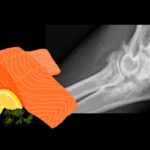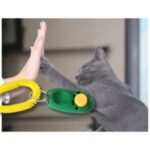Probiotics and the Gut-Brain Axis

Google searches for dog probiotics are up over 91% in the last 5 years and videos about pet probiotics and videos mentioning the product have over 386 million views on TikTok.
A little background first…
What is a Microbiome?
The microbiome is a community of trillions of tiny organisms living inside and on your pet (and you too!), especially in their gut.
These microbes help with:
Digestion: The microbes break down and ferment food that your pet can’t digest on their own, especially fibers and complex carbs. This process produces short-chain fatty acids (SCFAs), like butyrate, which provide energy to the cells lining the gut and help maintain a healthy digestive system.
Immune System Support: The gut microbes interact with the immune system by teaching it to recognize harmful invaders and prevent unnecessary inflammation. A balanced microbiome helps the immune system stay strong and responsive, reducing the risk of infections and chronic conditions.
Mood and Behavior: The gut is often called the “second brain” because it’s connected to the brain through the gut-brain axis. Microbes in the gut produce neurotransmitters like serotonin, which influence mood. A healthy microbiome can reduce stress and anxiety in pets by keeping this communication smooth.
What are prebiotics?
Prebiotics are the food that these good bacteria need to thrive.

They are non-digestible food components (dietary fibers) that are fermented by intestinal bacteria. The most common are fructooligosaccharide (FOS) and inulin. They are derived from many foods like chicory root, leeks, and garlic but can also be bought in an over the counter formula like Metamucil Clear and Natural (inulin from chicory root) and Benefiber (FOS). Many pet foods also contain prebiotics.
Potential Uses For Probiotics in Dogs and Cats:
- Gastrointestinal Health: Probiotics may shorten the duration of acute diarrhea in pets, decrease problems associated with antibiotic administration, and help to manage chronic diarrhea or inflammatory bowel disease (IBD).
- Dental Health: Some probiotics have shown promise in reducing dental plaque and gingivitis in dogs.
- Chronic Kidney Disease: Probiotics may help manage in dogs and cats with chronic kidney disease.
- Skin Allergies (Canine Atopic Dermatitis (AD): Probiotics may help manage symptoms in dogs with AD, though results are mixed.
- Managing Stress and Behavior
What??? How can microbes in the gut affect stress, behavior and mood?
The Gut-Brain Axis:
A communication network that links the gut and the brain, allowing them to influence each other’s functions.
The microbiome can affect the brain in several ways:
- Neurotransmitter Production: Some gut bacteria produce neurotransmitters like serotonin and GABA, which regulate mood and anxiety.
- Vagus Nerve Stimulation: Signals from the gut microbiota can travel to the brain via the vagus nerve, impacting brain activity and behavior.
- Immune System Interaction: Gut microbes influence the immune system, which can affect brain health by regulating inflammation.
- Metabolite Production: Microbes produce short-chain fatty acids and other metabolites that cross the blood-brain barrier, influencing brain function and mood.
- Preventing “leaky gut” that can lead to systemic inflammation and stress-related behaviors.
Wild!
One key probiotic for this purpose is Bifidobacterium longum (BL999), used in Purina ProPlan Calming Supplement for dogs and cats.
These probiotics can be particularly beneficial for pets dealing with:
- Separation anxiety
- Noise phobias, such as fear of thunderstorms or fireworks
- Stressful situations like vet visits, travel, or new environments

Probiotics are measured in colony forming units, or CFUs. The current recommendation for dogs is 1-10 billion CFUs a day. Probiotics are safe and only a concern in severely immunocompromised patients.
Veterinary products:
- Purina Fortiflora – one strain- Enterococcus faecium, Fortiflora Pro Synbiotic also has a prebiotic
- Purina ProPlan Calming Care Supplement- BL999 strain for anxiety
- Nutramax Proviable and Proviable Forte- seven strains of bacteria and two prebiotics
- Azodyl by Vetoquinol- for pre and probiotic for kidney disease
If you’re wondering whether a probiotic and prebiotic might benefit your pet, be sure to check with your vet.




